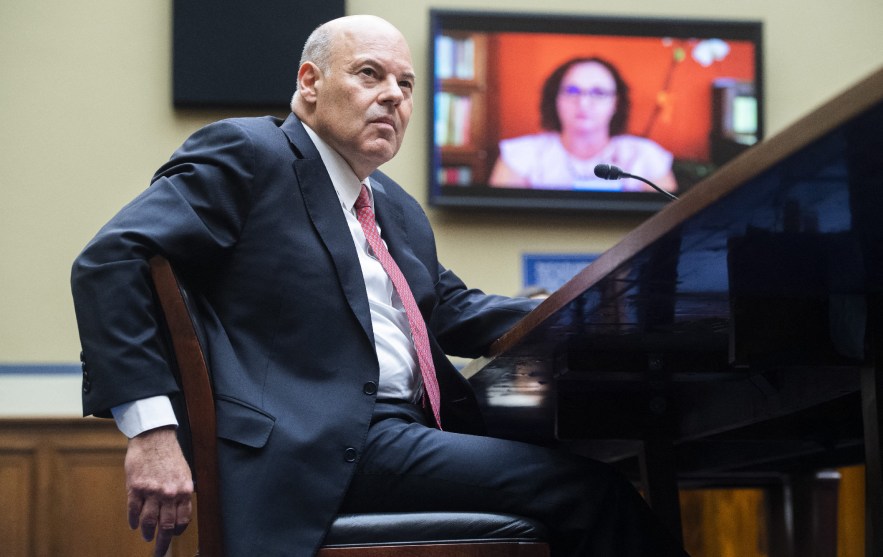
Carl Owen spent most of his adult life working for the United States Postal Service. Unlike other workers in our Bad Bosses series, he wasn’t unjustly fired. He wasn’t sexually harassed. He wasn’t forced to quit. He made it to retirement.
But that doesn’t mean he didn’t have bad bosses—specifically, bad bosses beholden to a massive bureaucracy. As Owen wryly noted in his initial email to us: “Remember when we go postal we only shoot the bosses, never the customers.” Then he added a little smiley face.
I’m from central Oklahoma. I was gonna be a cop but found out real fast I didn’t like getting into fights with people I didn’t know. I went to work for the post office in November of ’86, which was about four months after Pat Sherrill did the first postal shooting, in Edmond, Oklahoma.
The bosses were pretty good at first. I got to talk to some of the older hands, and they told me their horror stories about how bosses had acted in the past. The shooting was a real wake-up call for them. I transferred to being a letter carrier about a year and a half later and did that until I retired 29 years later.
It was a good job here in Oklahoma. We work on a national contract. I made the same as letter carriers in New York. I live in a 2,500-square-foot, four-bedroom, three-bath house with an in-ground pool in a nice neighborhood. And, of course, it had good benefits. I enjoyed the job. When I went to work in ’86, everything important went through the Postal Service. Now, it’s pretty much down to junk mail.
Progressively, the bosses got back into the old habit of bully and intimidate and harass. The standard joke every time we’d get a new supervisor was, Who’s going to be the new whipping boy? The new boss would look around and find somebody they didn’t like.
I was a union steward for a number of years. I would sit down and tell workers who were being targeted to calm down. I’d say, “If you haven’t done anything wrong, all this is is harassment.” The managers very rarely get fired. They have a union called the National Association of Postal Supervisors. I just love that acronym. NAPS.
I took over a route that had historically taken 10 to 12 hours every day. I got it down to eight hours a day. I was pretty proud of myself. Look, I’m saving the Postal Service two hours of overtime every day, and my customers are getting taken care of. The boss decided to adjust my route. Then he began to beat me up, like, “Why are you now using 30 minutes of overtime every day?” It’s like, “Boss, you changed my route. I can’t do it in eight hours anymore.” That’s when I realized that you get punished for being efficient.
One of my station managers was always seeking some magic silver bullet that would miraculously reduce the time it took carriers to either prepare for delivery or to deliver mail. They always failed. His explanation was we carriers were guilty of “malicious compliance.” The first time he uttered the phrase I was reduced to howls of laughter.
They had a program called DOIS. Basically it’s a really simple little system that said, on a certain day, you had X number of pieces of mail and it took you seven hours to do your route. Therefore you have an hour of downtime and we’re going to give you an hour off another route. We expect you to do your route that extra hour and be back in eight hours. Now it may have been sunny and 72 degrees on the other day. Today it’s 104 degrees. It may have been different mail types that were easier to handle. They don’t figure in weather or anything like that. It’s just determined by how many pieces of mail and past performance.
I’m a retired major out of the Army Reserve. I was an engineer officer. I’d try to tell the boss, “It’s unworkable. I’ve done much more complex tasks with much better tools and your system won’t work.” But it didn’t matter. That’s what comes down from the big boys. Their philosophy is very simple. If I don’t crack the whip on you, they’re going to just fire me and put somebody else in here who is going to crack the whip on you. So we’re going to be jerks and hold you to a standard that can’t be met.
We had a guy who tried to fire me twice. Our standard joke is you’re not a good steward unless you’ve been fired at least once. The first time, I used foul language in his presence in his office, which he found out by law I could do. The other time we were doing an investigative hearing on a carrier who had left two trays of letter mail sitting out by an apartment box and drove off. I said, “Man, it just sounds an awful lot like Pat Sherrill in Edmund.”
Soon after, my boss said, “I’ve spoken with the station manager, and we feel that what you said was a threat of violence. I’m going to have to ask you to leave.” He took my keys, took my postal ID badge, and escorted me off the property. This is Saturday. He said be back at 7 o’clock Monday morning and we’re going to have a pre-disciplinary interview. We go through the little hearing. He said, “Go home and await a call from the Postal Inspectors.”
I knew what was going to happen. I’m going to spend 30 days on paid leave sitting around and getting paid to watch Oprah and Dr. Phil, then I’m gonna get my job back. I was just starting to get comfortable—having a beer—when I got a call from a new supervisor.
She said, “Carl, I need you to come in tomorrow morning.” I said, “Do you not know that he fired me?”
“Well, I don’t know about that, but I need you to come in tomorrow to work your day off.”
Toward the end, there was this manager who was 22 years old. He got hired and, once he got through probation, he immediately applied for management. Most of the supervisors, they’ll tell you they were the greatest carriers on earth. Then you talk to carriers who worked with them and it’s like, no. The reason the boy is in management is the boy just didn’t like to work.
I was 90 days away from retirement. The 22-year-old told me that I had an hour of downtime and gave me an hour off another route. I’d been medically restricted for seven years at this point. I’ve had an ACL replaced. I’ve had arthroscopic surgery on the knee. Tore a rotator cuff. Carrying mail is slips, trips, and falls. I’ve had carpal tunnel on both hands. I’ve got an artificial right thumb joint. I literally wore out the thumb joint on my right hand. All this is the Postal Service. The only thing the military gave was bad hearing and a pension.
So, my boss said, “Here’s an extra hour.” The rules under our union contract are real simple. In the morning, when he told me that, I said, “I cannot do that. I have eight hours of work on my route. I’m going to bring back this extra hour. You’re going to have to find somebody when I come back in at 3:30 to take it back out and carry it.” So I came back at the end of the day and said, “Here’s the hour. Where do you want it?”
He looks at me and says, “You’re no use to me.”
“Beg your pardon?”
“You should have done it.”
It’s because his little system said I had an hour. By that time, we were all tracked by GPS. I was like, “If you don’t believe me, you can sit there at your little desk, look at your computer monitor, and watch me from the time I clock out of the station and start my route to the time I clock back in. You’ll know where I am every two seconds of the day. If you think I have dead time, pull it up and we’ll review it and see where you think I could have picked up an extra hour.” He just shook his head and walked off.
I learned after I retired in 2015 that he joined the Army. I was really tempted to find out where he was going through Basic. I was going to grab one of my dress uniforms. Major Owens was going to pay him a visit. But he ain’t worth the gas money. Before he even graduates, they found out he had a bad knee. They gave him a general discharge under fraudulent enlistment because he told them he was in good health. What does the Postal Service do? Bring him back and make him a supervisor again.
This story is part of our Bad Bosses project, a reported collection of accounts from workers about their terrible bosses and the system that creates them. You can read more about the entire project and find every story here. Annotations—highlighted throughout—can be clicked for further context and comment from other parties. Got your own bad boss story? Send us an email.
















